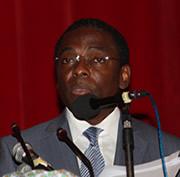WHO Regional Committee for Africa Opens in Yamoussoukro
Yamoussoukro, 29 August 2011 – The sixty-first session of the World Health Organization (WHO) Regional Committee for Africa got underway on Monday in Yamoussoukro, Cote d'Ivoire, with a call on Member States to honour their commitment to the Abuja Declaration of allocating at least 15 % of their national budgets to health.
The call was made by Ivorian Minister of State and Minister of Foreign Affairs, His Excellency Mr. Daniel Kablan Duncan, who opened the meeting on behalf of President Allasane Ouattara.
Mr. Duncan thanked Member States for the opportunity to host the meeting and presented the condolences of the Government and people of Cote d'Ivoire to the UN system for the deaths resulting from the recent bombing of the United Nations House in Abuja, Nigeria.
He commended Member States for the progress made on key health indicators but ex-pressed concern about persisting challenges, including the low life expectancy in the Region, and high maternal and child mortality rates. He reiterated the commitment of his government to making the necessary efforts for accelerating progress towards the achievement of the Millennium Development Goals.
In her speech, the Ivorian Minister of Health Prof. Therese Ndri Yoman, said that the African Region still faced challenges such as high maternal mortality and continuing out-breaks of epidemics such as polio, cholera, malaria, measles, and yellow fever.
Noting that some of these diseases had been eradicated or were on the verge of eradication in other parts of the world, she called on the ministers to come up with strategies to eradicate them in the Region, as well as facilitate access to medicines for the treatment of diseases plaguing the Region.
In her remarks, WHO Director-General , Dr Margaret Chan, made reference to the bombing of the United Nations House in Nigeria on 26 August, saying: "Let me join others in expressing my profound dismay over Friday's bombing of the UN compound in Nigeria. This touched the UN family and it touched WHO, as our staff are among the dead and severely injured. I extend my deepest sympathy to the families and loved ones of those affected. I express my outrage at those who attack people devoted to helping, to preventing harm."
Dr Chan noted that the Regional Committee meeting was taking place in very difficult times characterized by a global financial crisis, civil unrest, mass protests, debt crises, dis-ease outbreaks and disasters such as floods and drought.
On Africa's response to climate change, recurring disease outbreaks and other humanitarian disasters, Dr Chan told the meeting: "This region is wise to be planning now, to cope with the consequences of climate change, especially as we know that countries in the re-gion are among the most vulnerable in the world. You are wise to have detailed plans for an African Public Health Emergency Fund."
The Director-General noted that the world had now entered a new era of financial austerity with profound implications for national health budgets, international health assis-tance and the future financing of WHO. "WHO needs to reform to better serve," she said.
In his speech, the WHO Regional Director for Africa, Dr. Luis Sambo, stated that in the area of health, progress made in the Region included the introduction of a new conjugate vaccine for cerebrospinal meningitis; decreasing trends in infant mortality rates; a decrease in HIV incidence by more than 25% in 22 countries; increasing access to antiretroviral therapy and insecticide-treated bed nets, and a reduction by more than 50% in malaria-related deaths in health facilities in 12 countries.
Dr Sambo however added that despite the progress made, the Region still faced several challenges.
These include recurring epidemics like cholera; cerebrospinal meningitis; haemorrhagic fever; yellow fever and Rift Valley Fever as well as natural disasters such the drought which was affecting the horn of Africa.
He said that the droughts and floods which were being experienced in parts of the Region were occurring within the context of climate change, hence the need for the Regional Committee to deliberate on a framework for public health adaptation to climate change.
The Regional Committee, WHO's Governing Body in the African Region, is made up of Health Ministers from the 46 countries which constitute the African Region of WHO. Its principal brief is to review WHO's work in the Region and provide guidance on suggested actions to improve the health situation in Member States. Ministers of Finance from some Member States are also attending the meeting.
For more information, please contact:
MEDIA CONTACT:
Samuel AJIBOLA, WHO/AFRO, P.O. Box 06 Brazzaville, Republic of Congo
Tel: +47 241 39378 (In Yamoussoukro 09301251)



